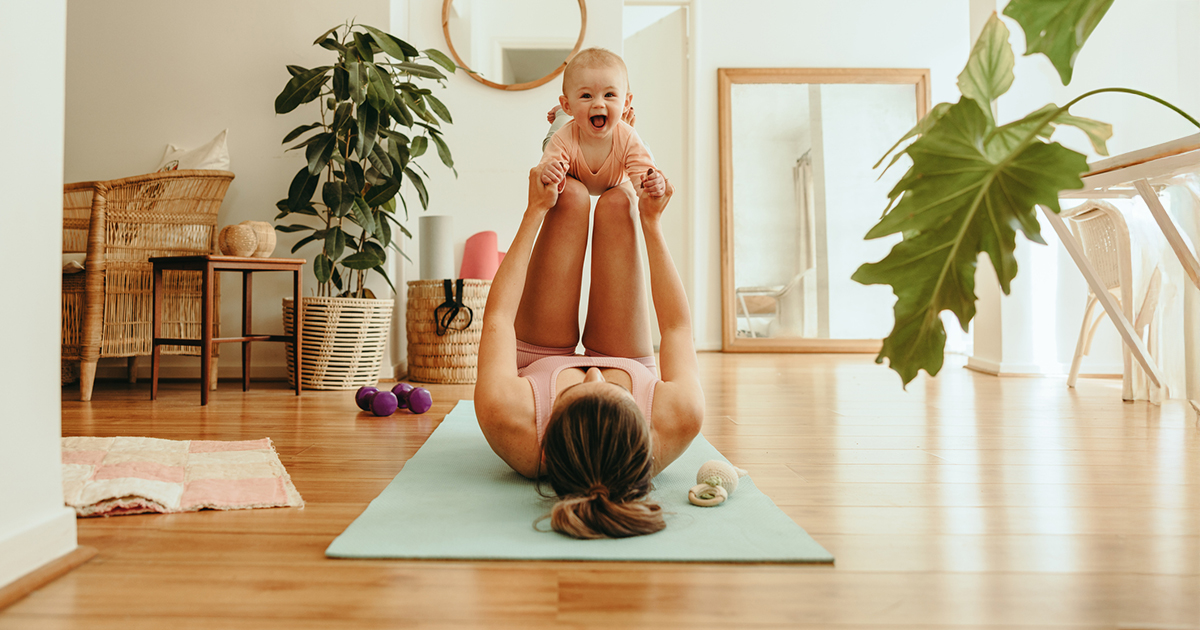Welcoming a baby into your life can bring a lot of joy, but it can also bring its fair share of chaos. Your identity may change. Your normal routine may get upended by a cycle of feed, burp, diaper, sleep. You may start to feel isolated.
Here’s the good news: One of the best ways to find some calm and normalcy can also help you form a stronger bond with your baby. That’s getting active.
Countless studies show the mind-body benefits of moving our bodies at any stage of life. Exercise releases endorphins. Those feel-good hormones can help reduce stress and improve mood, which can help all parents but especially those at risk of postpartum depression or anxiety.1 (Workout hour beats witching hour, after all!) Research has also shown that positive interactions are key to shaping both parental bonds and baby’s social and emotional health.2
Like other aspects of life, how and when you move your body may look different than it did before baby. That’s okay. “Start small and stay flexible,” says behavioral coach and AbleTo Coach Advisor Carolyn Oldham. “Even short periods of movement throughout the day can reap big benefits for you and your little one.”
Not sure where to start? We’ve got 8 simple ways to get you (and your baby) moving.

Achieve your mental wellness goals
AbleTo programs give you 24/7 access to tools, activities, and content tailored to your needs. Sign up or log in to start exploring.

How to get active with your baby
Take walks
One of the easiest ways to get active with your baby is to go for a walk. Research shows walking in nature can decrease stress and improve mood.3 Whether you use a stroller or a baby carrier, your baby will love looking at the world around them. Plus, the fresh air will do both of you a world of good. Want to switch up your scenery? Keep a list of walking paths or areas handy. The Freewrite Journal in the AbleTo app is one place to jot down ideas.
Try babywearing workouts
Your bundle of joy can also serve as your new favorite free weight. (Postpartum moms should just make sure they’ve been cleared by their doctor first.) Wearing your little one while doing simple squats or lunges adds a bit of resistance. Make a new silly face after each rep to see how baby reacts.
Dance around the living room
Research on dance suggests it can improve mental health.4 Take advantage of the time before Ms. Rachel and Baby Shark rule your Spotify Wrapped to put on your favorite music. And if baby is fussy, use a side-to-side motion to calm them down. “It’s a great option for bad weather days when going outside isn’t in the cards,” says Oldham.
Do stroller workouts
Up for a challenge? Turn your stroller walks into an interval workout. Find a smooth path and add in some short bursts of speed, lunges, and stretch breaks. You can make it as tough or gentle as you like. Bonus: Pretend you’re a coach and talk to your baby about what you’re doing to build language.
Practice tummy time together
Tummy time helps strengthen baby’s muscles, but it can be a chance to care for yours, too. Get down on the floor with them and work through some basic yoga poses. If you’re up to it, you could also weave in simple core exercises. “Adding in one more thing to the day may feel overwhelming,” says Oldham. “But tacking on a bit of activity for yourself in moments like this can help it feel more doable.”
Attend a parent-and-baby exercise class
Classes can help you bond with both baby and other parents. Look for options at your local gym or community center. Or check posts on local Facebook parent groups for ideas. “Support and social connection can be just as beneficial for your mental health as the exercise itself,” says Oldham.
Make playtime active
You don’t always need a structured workout to be active. Simply playing with your baby can be a fun way to get moving. Lifting your baby in the air works your arms; crawling with them can strengthen your core.
Get a good stretch
Studies show that stretching can help relieve stress.5 Make it a game of peek-a-boo while baby is laying nearby. Or use them as gentle resistance to deepen some grounding stretches.
Small steps create big impact
Getting active with your little one doesn’t have to be complicated. Small amounts of movement add up. Taking a short walk, dancing in the kitchen, or stretching during playtime can all reduce stress, boost energy, and strengthen your bond with baby. So no matter how you go about it, it’s worth putting in the effort.
And if there are days when you just want some solo movement? That’s okay, too. “Taking care of yourself is just as important as caring for your baby,” says Oldham. “In the end, it’s all about finding a mix that works for you.”
Need some support?
AbleTo is here to help. From on-demand self care to virtual therapy and coaching, we make managing your mental wellness easy. Sign up and get the personalized support you deserve.
By Sarah Bruning
Sarah Bruning has been a journalist and content strategist for more than 15 years. Her work has appeared in leading publications including Women’s Health, Travel + Leisure, and Cosmopolitan.
Clinically reviewed by Kelli McElhinny, LCSW, a licensed therapist and AbleTo Clinical Content Producer.
Stock photo by Jacoblund/iStock. Posed by models.
The information featured on this site is general in nature. The site provides health information designed to complement your personal health management. It does not provide medical advice or health services and is not meant to replace professional advice or imply coverage of specific clinical services or products. The inclusion of links to other websites does not imply any endorsement of the material on such websites.
Sources
1. Smith PJ, Merwin RM. The role of exercise in management of mental health disorders: An integrative review. Annual Review of Medicine. 2021;72(1):45-62. doi:https://doi.org/10.1146/annurev-med-060619-022943
2. Suzuki D, Ohashi Y, Shinohara E, et al. The Current Concept of Paternal Bonding: A Systematic Scoping Review. Healthcare. 2022;10(11):2265. doi:https://doi.org/10.3390/healthcare10112265
3. Olafsdottir G, Cloke P, Schulz A, et al. Health Benefits of Walking in Nature: A Randomized Controlled Study Under Conditions of Real-Life Stress. Environment and Behavior. 2018;52(3):248-274. doi:https://doi.org/10.1177/0013916518800798
4. Tao D, Gao Y, Cole A, et al. The Physiological and Psychological Benefits of Dance and its Effects on Children and Adolescents: A Systematic Review. Frontiers in Physiology. 2022;13(925958). doi:https://doi.org/10.3389/fphys.2022.925958
5. Sakurai M, Yasushi Ikarashi, Tabuchi M, Hu A, Yamaguchi T, Kobayashi H. Static Stretching Combined with Conscious Slower Breathing May Increase Parasympathetic Activity and Reduce Stress in Adult Women. Health. 2024;16(03):242-256. doi:https://doi.org/10.4236/health.2024.163020


